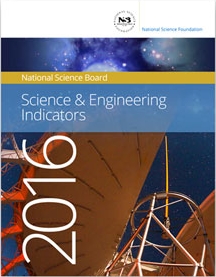 Public opinion about evolution and the Big Bang was reviewed in the National Science Board's Science and Engineering Indicators (PDF) 2016.
Public opinion about evolution and the Big Bang was reviewed in the National Science Board's Science and Engineering Indicators (PDF) 2016.
In the 2014 General Social Survey, respondents were asked whether "human beings, as we know them today, developed from earlier species of animals" was true or false; 49% said that it was true. Respondents were also asked whether "the universe began with a big explosion" was true; 42% said that it was true. The report commented, "Both scores are relatively low compared with scores on the other knowledge questions in the survey."
Those questions have not been used in the National Science Board's assessment of scientific literacy since 2010, on the grounds that they may measure personal belief rather than scientific knowledge. A box in the 2016 report discusses experimental evidence comparing responses to a question about human evolution to responses to a question about elephant evolution, which the NSB contends "proves better ... in capturing scientific knowledge."
Internationally, the United States was next-to-last for the evolution question, ahead only of Russia in 2003, with 44% of respondents correctly answering; Japan in 2011 did the best, with 78% of respondents correctly answering. The United States was in the middle of the pack for the Big Bang question, with 42% of respondents correctly answering; Canada in 2013 did the best, with 68% correctly answering.
Although the section on "Public Attitudes about Specific S&T-Related Issues" is billed as describing views on "teaching evolution in schools," no discussion is provided.
